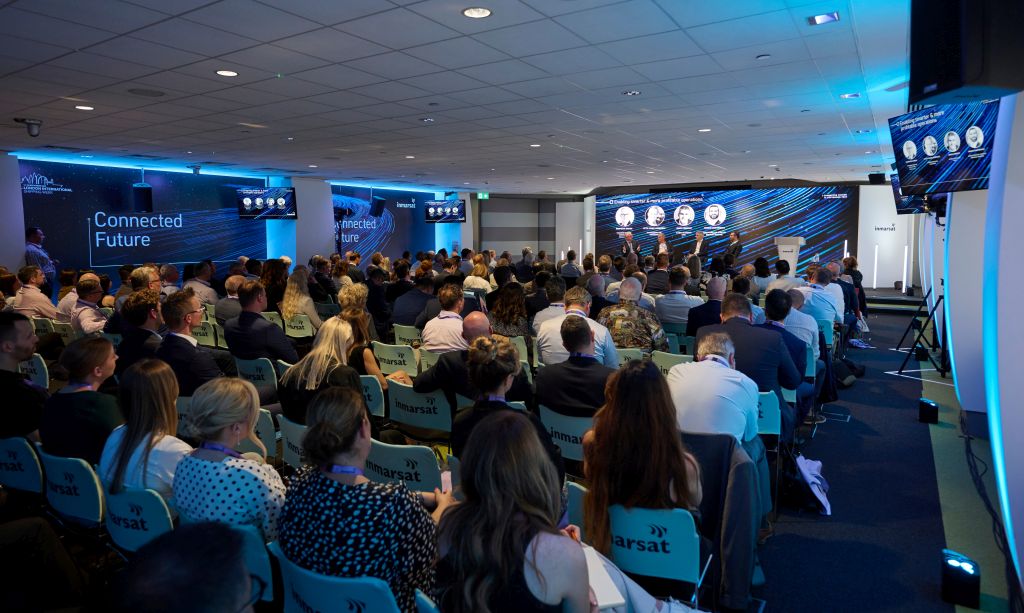
(www.MaritimeCyprus.com) The Inmarsat Connected Future Conference at this year’s London International Shipping Week examined how the industry can move from talk to practical solutions that can ensure satellite technology plays a decisive role in shaping smarter and more sustainable shipping.
Inmarsat Maritime president Ben Palmer provided the scene-setting keynote address for the first panel discussion on collaboration, technology, data sharing and balancing the imperatives of growth with reduced ship emissions.
He reiterated his message that “connectivity is the oxygen-sustaining opportunities for
shipping to create value and cut its CO2 emissions.”
And guest speaker Helen Sharman CMG OBE, who became the UK’s first astronaut in 1991, wrapped up the afternoon with an inspiring speech about the importance of collaborative
team efforts in space missions.
The panel, which was moderated by Giampiero Soncini, Managing Director, Oceanly,
included Peter Schellenberger, Founder of Novamaxis, James Pomeroy, Global Economist,
HSBC; and Marco Cristoforo Camporeale, Senior Director, Strategy at Inmarsat Maritime as
speakers.
Peter Schellenberger of Novamaxis stressed that it was now “high time for action” to advance shipping’s smart and sustainable agenda, picking low hanging fruits by adopting proven solutions from other sectors, such as the aviation industry.
Breaking down silos that prevent necessary information sharing was being helped by the need to respond to environmental, social, and governance (ESG) criteria, he said.
However, he cautioned that more standardisation of maritime protocols was a vital first step, citing 14 non-compatible types of noon report as having to be written by one ship
management company.

Leaders in ship supply and management are needed to bring greater compatibility, Schellenberger said. “If we all put our heads together, we can make our lives so much easier. In this new world reliable information and access to it is the backbone of future changes.”
Empowerment of vessel control centres is also necessary to achieve efficiency gains, he added, and “will drive meaningful change.”
Maritime software veteran Giampiero Soncini, who now heads Oceanly, said: “Everyone
wants control centres, but few have a clear understanding on how to effectively use them.”
Inmarsat’s Marco Camporeale said just 40,000 out of 170,000 ships registered by the IMO
have data transmission speeds capable of taking advantage of onboard digital systems for
voyage optimisation.
“So, four out of five ships do not have the level of connectivity required to power artificial
intelligence and machine learning. We are still far from realising that vision of a connected
future, where we can look at a shipping industry that can meet the 2050 IMO targets for decarbonisation” he said.
It is not just a question of data speeds, but understanding the value that can be extracted
from connectivity, he added, but discussions on creating a standard automated version for
noon reports are still ongoing.
Schellenberger responded that greater integration of IT systems is also required. Most
historical systems do not have open APIs to integrate them. It could take up to 20 emails to order one spare part, he said.
Seafarers, who have their own phones and computers, step back technologically 20-30 years when they board a ship, and training has not kept pace with changes coming to the
equipment and alternative fuels they will use in future, Schellenberger said.
One in three seafarers looks for connectivity on board as more important than salary when
looking at which owner or ship manager to work for, added Camporeale.
Soncini said Japan is leading the race toward autonomous shipping allowing fewer crew to
operate vessels. “In the last seven years the Japanese have congregated everyone –
classification societies, ship managers, owners and shipyards - and standardised everything.” The rest of the world needs to follow suit to achieve decarbonisation, he said.
Shipping had remained too reactive to legislative change, rather than proactive, Soncini added, with recent changes like the Carbon Intensity Indicator (CII) imposed in ways that left it unclear how decarbonisation would result.
Economists had not woken up to the importance of shipping in supply chains until the shock of the Covid pandemic, said James Pomeroy at HSBC, but that had changed now.
The last 12 months had seen a period of inventory rebuilding as demand fell back after the
surge during the pandemic when supply chains were unable to respond. New demand from
Asia was likely to lead recovery even if China’s role switched from production of goods to a
buyer of them.
Pomeroy said: “The outlook for now for the economy feeding back into shipping isn’t great,
but it will come back. We are not forecasting recessions or a collapse in demand. You just
need this inventory cycle to play through and you will get a natural pick up. It’s probably
going to be a 2024 story”.
However, he said inflation was a factor with wage rises in parts of the supply chain currently exceeding price increases, such as a shortage of drivers for haulage.













